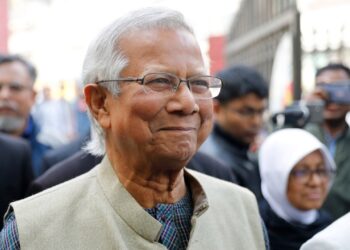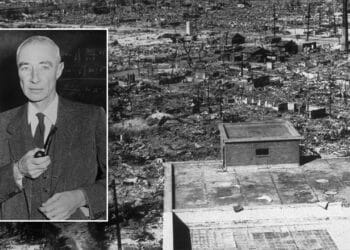[ad_1]

Supporters of Prime Minister Narendra Modi during a public meeting ahead of the Gujarat Assembly elections, in Dehgam town of Gandhinagar district on November 24, 2022.
| Photo Credit: PTI
Elections in Gujarat are usually boisterous, with political parties at daggers drawn. But this time, the campaigning is uncharacteristically muted — largely due to subdued electioneering by the Congress. In marked contrast to the 2017 Assembly election, when the Congress attempted a blitzkrieg led by Rahul Gandhi against the ruling BJP, its campaign in 2022 has been restrained. The party believes a diffuse campaign has denied the BJP an easy route to framing the election as a referendum on Prime Minister Narendra Modi. From 2002 onwards, it was around the Congress’s high-pitched attack on him that Mr. Modi had built his politics and persona. The BJP campaign this time, too, centres on Mr. Modi, with Chief Minister Bhupendra Patel finding little space even on the backdrop. But the Congress’s attack is not focussed on Mr. Modi. The absence of Mr. Gandhi and omission of grand themes have created relatively more space for conversations on governance in the State.
With the Congress piping down, the BJP is in need of a worthy adversary to animate its base. Medha Patkar, who was the face of the campaign against the Narmada dam, which is now a piece of Gujarati pride, the Muslim man who allegedly killed his Hindu live-in partner in Delhi in a savage manner, and alleged insults by the Congress directed at Mr. Modi in previous campaigns have all featured in the BJP’s attempt to conjure up a threat to Gujaratis and Hindus. However, Gujarati Hindus are far from feeling threatened at this point — the BJP has made them so self-assured that the party faces the threat of being a victim of its own success.
Also Read | BJP fights complacency, works hard to bring voters to the polling booth
‘Gujarat consensus’
The BJP is the lead custodian of what political scientist Mona Mehta of Ahmedabad University calls “Gujarat consensus” — a shared notion of the State’s Hindus regarding the cultural, economic and political order of the State. “There is no contesting that consensus in the Gujarat elections,” Ms. Mehta said.
“This consensus may be driven by the urban, upper caste middle class of the State, but there is large buy-in from all communities.” With economic, religious and caste order so entrenched, politics in the State is more about management and less about transformation.
Gujarati sub-nationalism blends well with Hindutva, but the takeover of India’s national politics by two politicians from the State — Mr. Modi and Home Minister Amit Shah — appears to have weakened the potency of the cocktail. The Hindutva takeover of Delhi has fundamentally changed Gujarat’s relations with the national capital. Until 2014, Mr. Modi used to accuse the ‘Delhi Sultanate’ of disparaging the State, and then he became the Prime Minister. Victimhood and exceptionalism used to ferment the combination of regionalism and Hindutva — the self-image that the State thrived on despite the discrimination by Delhi. This time, that narrative is the weakest in the last 25 years — the Centre has tilted the scales to ensure that three mega projects originally planned in Maharashtra moved to Gujarat ahead of the election, including the Tata Airbus aircraft manufacturing and Vedanta-Foxconn semiconductor manufacturing facilities.
Also Read | With two Opposition firebrands of 2017 now in BJP camp, election loses its spark
The expanding consensus on the Gujarat model in recent decades has narrowed the distinction between the BJP and the Congress, which is more of a problem for the former than the latter now. Political attitudes and social spheres of the supporters of both parties converge neatly around the “Gujarat consensus”. It is true that a larger proportion of the voters who are distant from the consensus lean towards the Congress. The farther one is from that consensus, the more likely she is to vote for the Congress — rural voters, tribespeople and Muslims.
Muslim votes
The main barrier for the Congress is that the Hindu middle class sees it as sympathetic to Muslims, a big turn-off for it. With the disappearance of Muslims from the political sphere of Gujarat, the fear of the Muslim is not what it used to be. The State has seen no Muslim mobilisation in recent years, be it on the Citizenship (Amendment) Act or the release of convicts in the Bilkis Bano case. Realising that active participation in politics is self-defeating, Muslims have resigned themselves to the reality of Hindutva dominance. The community has cold-shouldered All India Majlis-e-Ittehadul Muslimeen leader Asaduddin Owaisi’s attempt to stir them up. The influential Gujarat Samachar newspaper started terming him the “green lotus” — suggesting that he is in cahoots with the BJP.
The communal rhetoric in the State is also blunted by the Aam Aadmi Party, which is amplifying the class divides that are masked by the Gujarati consensus. It is showering promises of welfare schemes. Though party chief Arvind Kejriwal’s ability to alter the shared notion of the Gujarati voter remains an open question, he has dented the edge of communal politics in Gujarat, paradoxically, by pandering to Hindu sentiments, and keeping a distance from Muslims while not being brazenly anti-Muslim.
[ad_2]
















